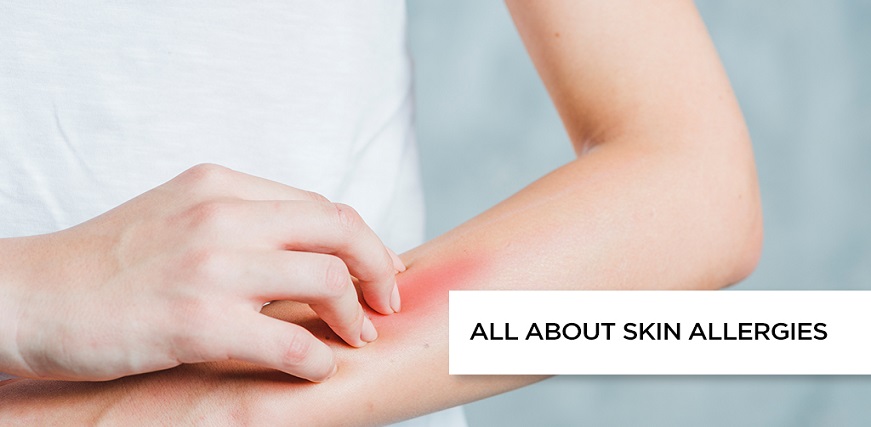





No lab centers are available in this city

Max Lab
Nov 02, 2022
Skin allergies are one of the most common sources of discomfort, causing symptoms like redness, bumps, itchiness, dry skin, and scaly skin. Over time they can aggravate other conditions such as eczema or psoriasis. In recent times, instances of different skin allergy types are on the rise. Environmental factors, like climatic changes, pollution, and diet, may play a significant role in the rise of skin allergies. It is also believed that several lifestyle factors may also be one of the reasons behind skin allergy instances increasing. Having an understanding of the trigger that causes skin allergy and seeking medical advice are important steps for the proper management of skin allergies and avoiding complications. Raising awareness about the different skin allergy types and taking some preventative measures are crucial for creating a healthier environment and improving the quality of life for people who may have skin allergies. Find out in this article what your early warning signs are!
Skin allergies are also known as cutaneous allergies and are caused when the immune system of the human body mistakenly reacts to something harmless. Different types of allergens can potentially cause skin allergies, such as pollen, food, medication, plants, and others. According to research, more than 3700 skin allergies exist. Unlike the other types of allergies, like hay fever, which affects the respiratory system, or food allergies, which cause digestive issues, the symptoms of skin allergy show up as reactions on the skin. When a person is first exposed to an allergen, it is identified as a harmful substance by the immune system, which produces specific antibodies that are designed to fight the allergen, based on the different types of skin allergy. The person may not experience or display any symptoms during the first exposure. It is during the subsequent exposures that the immune system again recognises the allergen and activates the antibodies. This triggers inflammatory chemicals, like histamine, to be released in the body. When the immune system is triggered by a harmless substance, mistakenly identifying them as an allergen, it results in the symptoms of skin allergy, like a rash, bumps, itching, or redness on the skin. Exposure to these substances can be through ingestion, inhalation, or direct contact. Sometimes it is easy to find the reason behind skin allergies, and sometimes it takes several allergy tests to know the exact cause. In medical terms, any type of skin allergy is called a hypersensitivity reaction.
There are many types of skin allergies. Some of the most common skin allergies are:
Urticaria is a skin allergy commonly known as hives, which is caused by the antigen Immunoglobulin E. It is a Type I hypersensitivity reaction. This allergy can be caused by various antigens found inside the human body, such as bacterial infection, infestation, and systematic disease. Some of the external triggers that can cause urticarial are inhalants, certain foods like poultry and meat, injury, and particular medications.
Symptoms of Hives
Diagnosis of Hives
The skin doctor may ask the person about their medical history, symptoms, and duration. They may recommend routine tests and skin allergy tests to diagnose the type of skin allergy and suggest treatment. One can get a full-body allergy test at Max Lab at an affordable rate. The test can be booked online at the official website of Max Lab.
Atopic dermatitis is commonly known as eczema. This skin disease is usually inherited from genetics. In this skin condition, the person’s skin reacts to mild environmental conditions. It is a type of skin inflammation that may lead to severe itching. This skin allergy commonly shows symptoms in children. It may also occur along with other atopic conditions such as hay fever, allergic rhinitis, and asthma. Some of the common causes of eczema are environmental factors, genetics, chemicals, and stress. Common irritants that are the causes of this skin allergy and itching are animal fur, soaps, dust, smoking, and other irritants.
Symptoms of Eczema
Diagnosis of Eczema
Atopic dermatitis can easily be diagnosed by physical examination as it has visible symptoms. Some of the common treatments for this skin allergy at home are to avoid getting in contact with the allergen if known, apply steroid cream recommended by the doctor, use mild soap, avoid chemical-based products, and avoid skin dryness.
Contact dermatitis is caused when the skin is exposed to an irritant. In this skin condition, the person suffers from skin inflammation and is considered an occupational disease in different parts of the world. People who are at high risk of this skin allergy are those who work in the chemical, paint, and plastic industries. It is a Type 4 hypersensitivity reaction. Contact dermatitis can be caused due to exposure to pollen, certain chemicals, the sun, topical antibacterial ointment, fabric, or any other irritant.
Symptoms of Contact Dermatitis
Diagnosis of Contact Dermatitis
The doctor usually recommends a skin patch test for the diagnosis of this skin allergy. During this test, the suspected allergen is applied to the patient’s back and the area is checked after 48 hours. If the area has unusual swelling or inflammation, then it confirms contact dermatitis. The doctor prescribes anti-itch lotion to calm the inflammation. The remedy for this skin allergy is to wash the area with clean water and avoid getting in contact with the allergen as much as possible.
There are multiple factors that may be the causes of a skin allergy, like exposure to pollen or certain plants, certain medication, etc. For different types of skin allergies in the human body, a person will generally develop different types of symptoms and the reasons for the skin allergy will also be different. There are thousands of allergens found. However, these are some of the common allergens that cause different types of skin allergies in the human body:
Certain types of flora, like poison oak or poison ivy, have leaves that tend to release oil when they are damaged. If it comes in contact with the skin, it can cause rashes that itch, bumps, or even blisters.
It is a metal that is found in several types of products that are used in daily life, like jewellery, hooks, paper clips, eyewear, and belts, and may often cause skin irritation.
For several people, a fragrance can be one of the causes of allergy in their skin. It is found in most cosmetics, perfumes, and lotions. Fragrances or the essential oils that are added to soaps, cleaning products, and deodorant often have certain harmful chemicals that can cause rashes and other skin allergy symptoms when the skin is exposed to them.
Chemicals that are found in household cleaners, cosmetics, antiperspirants, preservatives, sunscreens, bug sprays, adhesives with epoxy resin, cobalt that is used in jewellery, buttons and other regular use items, and others can also be the reason behind skin allergies. Many types of makeup and toiletries also contain chemicals, like formaldehyde, which may harm the skin. If one’s skin reacts to certain sunscreens, shampoos, hair dyes, commercially made tattoos, or makeup items, they should stop using the item immediately.
It is a natural rubber that is mixed with certain chemicals and can be found in balloons, gloves, elastics, erasers, and baby bottles. A latex allergy may just lead to mild symptoms, like a rash on the skin, or it may lead to severe symptoms, which may even cause difficulty in breathing.
New clothes, shoes, synthetic fibre, and woollen garments is another factor that may cause a skin allergy. The most common reason is because of the chemicals and dyes that may have been used to manufacture or colour the garments.
There are several types of topical medication, like pain relief balms. Eyedrops, creams, and ointments, that contain benzocaine, neomycin, or bacitracin, which can cause an allergic reaction in some people. These are generally found in products that are manufactured for treating insect bites, cold sores, burns, toothache, or small injuries and wounds.
Most skin allergies fade out on their own when they are not triggered. Once the person has identified what are the symptoms of the skin allergy, it is recommended to see a doctor who will ask them to get a skin allergy test. This is the cause of the allergy. Here are some of the common remedies that work in the case of skin allergy:












Sign up takes less than 60 secs and gives you access to your offers, orders and lab tests.
Looks like you are not registered with us. Please Sign up to proceed
OTP will be sent to this number by SMS
We have successfully received your details. One of the agents will call you back soon.
 To reach our help desk call 9213188888
To reach our help desk call 9213188888
No Lab Centers are available in this city
Looks like you are not registered with us. Please Sign up to proceed
OTP will be sent to this number by SMS
Not Registered Yet? Signup now.Looks like you are not registered with us. Please Sign up to proceed





 7982100200
7982100200.png)
Comments